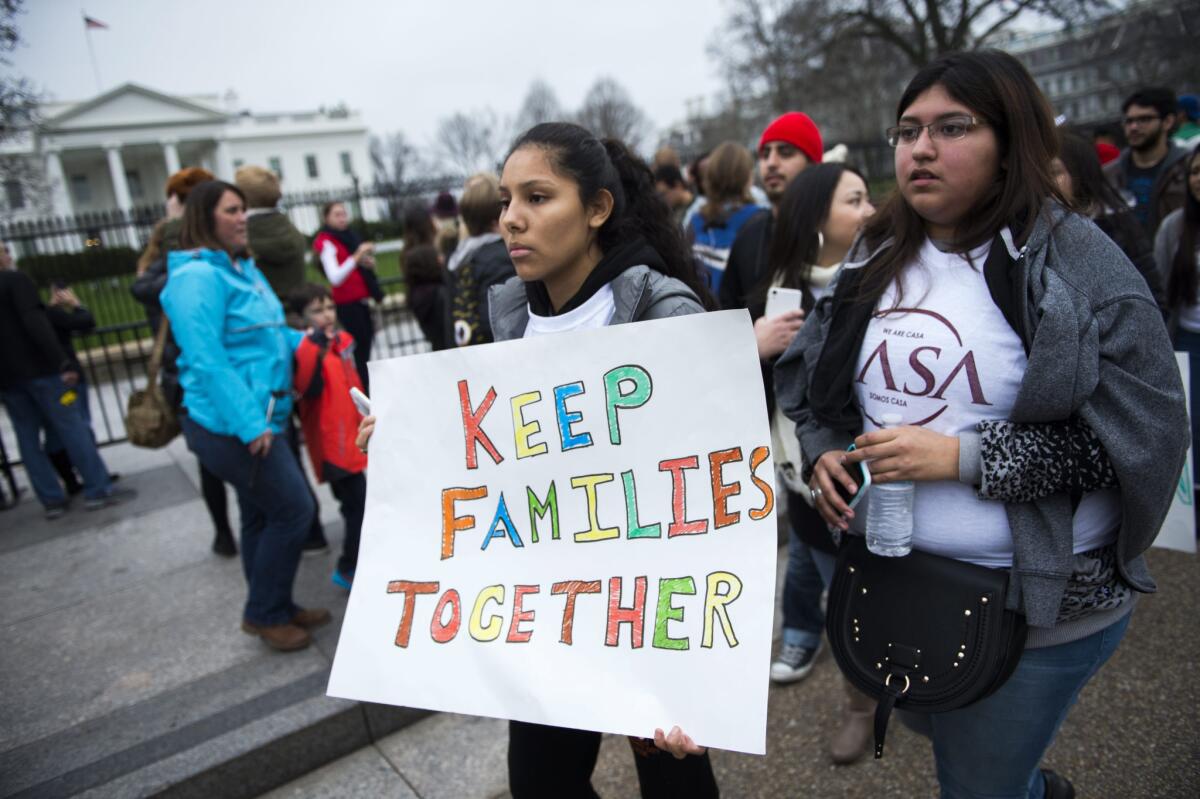ICE agents won’t be going onto Los Angeles public school campuses

Immigrant rights activists protest in front of the White House in December ahead of deportation sweeps.
- Share via
Immigration agents won’t be allowed onto the campuses of the Los Angeles Unified School District to look for undocumented students, the school board promised with a unanimous vote Tuesday.
The new resolution directs school staff members not to let any federal Immigration and Customs Enforcement agents enter school campuses or to provide them with student data without clearance. ICE officials who have any reason to be on campus -- such as those evaluating schools that offer exchange programs for non-immigrant students -- can visit schools only after their requests have been cleared by the superintendent and district lawyers.
Board members noted in the meeting that immigration agents haven’t come to schools looking for students.
Students are not actually in danger of being grabbed by ICE agents while at school; ICE considers schools and churches to be “sensitive” locations and does not carry out raids in schools, said spokeswoman Virginia Kice.
But families don’t trust the word of the immigration agency, and some were afraid to send their kids to school after ICE carried out a series of raids across the country last month targeting Central American immigrants, said board member Ref Rodriguez, who co-sponsored the resolution.
The resolution also gives the superintendent 90 days to create a plan to provide resources and information for undocumented and mixed-status families, including “a rapid response network to assist children whose family members have been detained.” The network would establish a procedure for what happens to students if they are in school when a parent is deported, their emergency contact can’t be reached, and there’s no one to get them to and from school.
L.A. Unified is following the example of other counties and districts nationwide -- the San Francisco Unified School District recently released a statement reminding families that ICE officials wouldn’t be allowed on campuses without a “thorough review process,” and county leaders in Montgomery County, Md., gave the Obama administration a similar message that they would not cooperate with deportation efforts.
Although there were no raids in L.A. last month, residents are concerned because the city has a large Central American immigrant population.
So to Rodriguez, the resolution is, in part, a symbolic gesture to tell families that “we stand for the safety of our children,” he said. “These are safe spaces.”
One major concern for families is what will happen to their children if they are detained during the day and their emergency contact is unavailable.
“We are afraid to send them to school or even myself to go to adult school,” one mother told the board members during their board meeting Tuesday. “We need you to make a plan. What will happen if I get picked up?”
It’s important for schools to train teachers and staff to educate parents on their immigrant rights because the home environment affects children’s school performance, said Victoria Dominguez, the education services and policy coordinator for the nonprofit immigrant rights organization CARECEN.
To be part of a mixed-status family that is worried about deportation and access to resources is “very stressful,” Dominguez said. “And that stress doesn’t stop with the parents.”
Although the board unanimously passed the resolution, board member George McKenna wanted to know more about the limits of the staff and campuses, he said during the meeting. For example, schools aren’t able to offer the same level of sanctuary that some churches have promised families.
“Schools function when school is open,” McKenna said. “Are we a safe haven when school is closed?”
Some ICE officials visit campuses if the schools have foreign exchange students with visas to study abroad in the U.S. They check out the schools to ensure that the campuses are legitimate learning environments. But during these checks, ICE officials said, they do not seek or request information about undocumented students.
“[F]ederal law requires ICE to continuously monitor schools and non-immigrant students by collecting data and conducting site visits,” Carissa Cuttrell, ICE Student and Exchange Visitor Program spokeswoman, said in a statement. School districts that block these officials from entering campuses would not be eligible to host international students.
School board President Steve Zimmer said in an interview that the goal of the resolution is to ensure immigrant families feel safe in schools, and exchange programs will not be affected.
Reach Sonali Kohli on Twitter @Sonali_Kohli or by email at [email protected].
More to Read
Sign up for Essential California
The most important California stories and recommendations in your inbox every morning.
You may occasionally receive promotional content from the Los Angeles Times.











